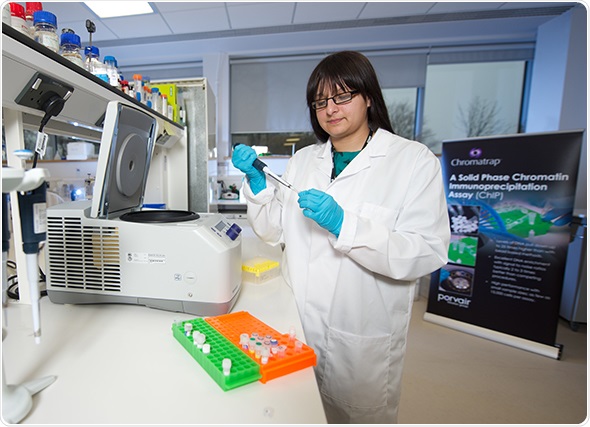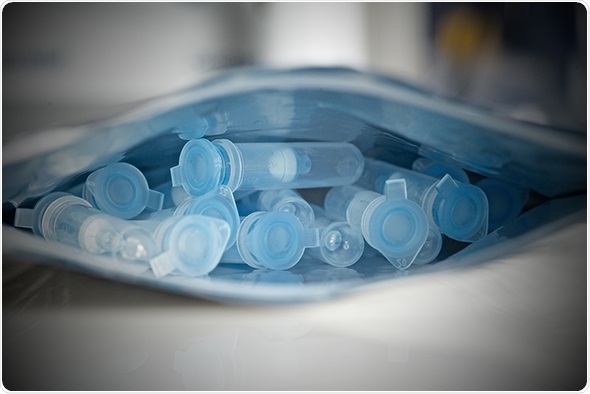Please can you give a brief introduction to your research?
My name is Steve Conlan. I'm a professor of cellular microbiology in the College of Medicine at Swansea University. The College of Medicine is a very new college in the UK. We're ten years old this year, and we work at the interface with colleagues in hospitals and very closely with businesses.
Our research focus is on women's health, which involves gynaecological investigations into infertility in women and into gynaecological oncology where we're most interested in uterine cancer, the lining of the uterus, the endometrium, and also ovarian cancer.
Our research into gynaecological oncology focuses around understanding mechanisms of how genes are regulated or how they become dysregulated in a disease; and also the effects that has on the surface of the endometrium and also the function of the ovaries.
How do you try to understand these mechanisms?
We take a conventional approach using molecular and cell biology and we also use the application of nanotechnology into the investigations.
On the molecular biology side, we're very interested in the epigenetic mechanisms that can go wrong in cancer, and also how the transcription mechanisms can go wrong.
We don't see a difference between transcription and epigenetics. We think these are completely intertwined, and we focus on them both at the same time.

When did you start to focus on epigenetics?
It was about five years ago when we started to push our epigenetics investigations. We realised that the technologies that were available were very limiting.
We've been working over that time with a company – Porvair – to develop disruptive technologies that are going to make epigenetic investigations much simpler, much more effective, faster, and aid us in pushing forward our research.
Please can you give an overview of Chromatrap?
We've developed a technology called Chromatrap, which essentially is moving from bead based methods of DNA enrichment to a spin column.
We've also cut down experimental times from several days to being able to do the whole process in a day, and that just allows us to tackle more samples.
How important is high-throughput analysis in your research?
We work very closely with the hospital. We have patient samples coming in every day so the more samples we can get through, the more robust our data analysis is and a better understanding of the disease processes we can elucidate from that.

What types of modification do you focus on and why?
We're very interested in how epigenetic markers, DNA methylation, histone acetylation are changed in cancers. If we can understand that, then we can begin to think what drugs can we employ in these cancers to make the cells in those patients return to normal?
We focus on histone modifications. There are a multitude of modifications that we can look at, and we need specialized antibodies against each of those. If we can understand that, we understand the picture of how a cancer may progress.
Then we target enzymes that are involved in this process such as histone deacetylases using drugs that are available for treating leukemias and seeing if we can we apply those to solid tumor cancers.
What impact do you think the Chromatrap system will have?
Epigenetic analysis has been complex; it's been a difficult technique. The system that we set up – the Chromatrap system – allows us to tackle high-throughput analysis. This is going to lead to the idea of using epigenetic targets in personalised medicine.
The approach that we've developed lends itself to high-throughput automation, and this is where we need to be going if we're going to analyse the epigenome of every patient.
For example, being able to target drug use in patients. We're going to need to know their epigenetic profiles and simple disruptive technologies that can be embedded into pathology labs are going to enable us to do that.
What do you think the future holds with regards to companion diagnostics?
Companion diagnostics is a rapidly emerging area, and there are a few examples out there of how tests are essential before you can give a drug, maybe because it's too toxic if you don't or maybe it just won't benefit the patient if you don't.
At the moment, our epigenetic research is about aligning drugs with biomarkers. It's at a very early stage, but it is an evolving area, and it will make an impact in the future.
Where can readers find more information?
About Professor Steve Conlan
Steve Conlan is Professor of Molecular and Cell Biology, head of Reproductive Biology and Gynaecological Oncology research and Director of the Centre for NanoHealth at Swansea University, Wales.
Prof Conlan works closely with the life science and healthcare industrial sector, and has active collaborations with SMEs and multinational companies. As Director of Strategic Partnerships, and member of Swansea University’s Internationalisation Strategy Group, he leads strategic collaborative initiatives with Grenoble - France, Houston - US and Suzhou and Wuhan – China.
Prof Conlan holds an honorary consultant position in the Abertawe Bro Morgannwg NHS Board, working with clinical colleagues in Singleton Hospital Swansea and The Princess of Wales Hospital Bridgend. He is a Senior Affiliate Member of The Methodist Hospital Research Institute, Houston Texas, and Distinguished Professor at Xi'an Jiaotong University, Suzhou Academy, China.